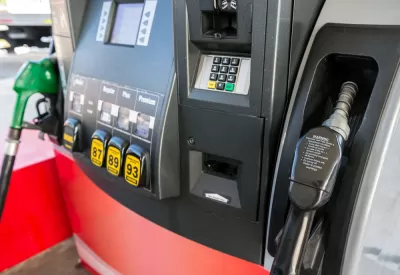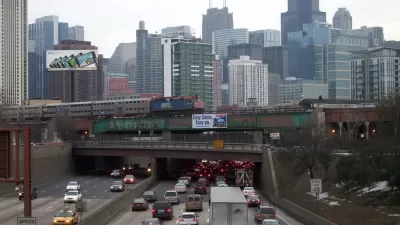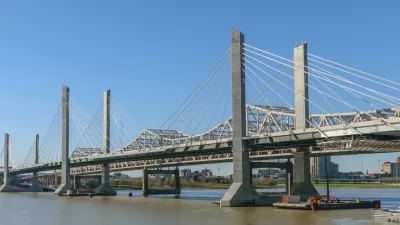However, neither state will ask voters to increase the gas tax. Instead, they ask voters to assure that gas tax and other transportation-derived revenues are spent on transportation. Neither state has raised the tax in over 25 years.

"Voters in Illinois and New Jersey will determine on Election Day whether money raised from transportation-related activities should be protected from the general budget," reports Daniel C. Vock, Governing’s transportation and infrastructure reporter. These types of constitutional restrictions on how revenue derived from transportation funding sources can be spent are referred to as 'lockboxes.'
The measures say nothing about the inverse of the measures' intentions: preventing the taking of general funds and using them for transportation purposes, which common sense would indicate as more likely to occur as the gasoline excise tax hasn't been raised in either state for more than a quarter of a century according to the Institute on Taxation and Economic Policy.
In fact, New Jersey Gov. Chris Christie did just that in August by signing an executive order that replenishes the state's insolvent Transportation Trust Fund "with money from elsewhere in the state budget," reported New Jersey 101.5.
The Illinois measure claims that transportation funds have been diverted according to the FAQ [#3] for the Safe Roads Constitutional Amendment (written by the Citizens to Protect Transportation Funding, which is staffed by the labor-management organization, The Indiana, Illinois, Iowa Foundation For Fair Contracting):
Over the last decade, the state has diverted more than $6 billion away from transportation projects that should have been spent on them.
For the actual ballot measure, see Ballotpedia: Illinois Transportation Taxes and Fees Lockbox Amendment (2016). It is based on Illinois House Joint Resolution Constitutional Amendment (HJRCA 36).
The Chicago Sun-Times editorial board opposes the measure. "A lockbox is nothing but an admission of failure, and we urge you to vote the idea down November," they write. Similarly, the Chicago Tribune blasted the "Safe Roads Constitutional Amendment," suggesting that it be called "The Illinois Crony Protection Amendment of 2016" instead. They write:
Budgeting for bridges doesn't belong in a constitution. It's a key but routine goal that governors, members of the General Assembly and local governing bodies can enforce on their own — without making the Illinois Constitution a playpen for some verrry special interests.
In response, James R. Reilly of the Metropolitan Planning Council wrote that it would be difficult to advocate for increasing transportation revenues "unless the public can be assured that the funds will go to the intended purpose."
The MPC supports hiking the state gas tax by 30 cents a gallon and increasing registration fees by 50 percent.
According to Ballotpedia, "in order for a legislatively referred constitutional amendment to win in Illinois, it must be approved by at least 60 percent of those voting on the question or by a majority of those who cast a ballot for any office in that election."
In New Jersey, the transportation funding situation may arguably be the worst in the nation. On June 30, Republican Governor Chris Christie was forced to declare a 'state of emergency' and shut down many road projects because the state's Transportation Trust Fund has run out of funds, and "owes $30 billion in principal and interest."
The state senate and Gov. Christie are at an impasse as to how much to cut other taxes, in particular the sales tax, in order to pass a 23-cent increase to the 14.5-cent gas tax, the second lowest in the nation. The deal is known as a tax shift because it plays funding the government against funding roads.
According to Ballotpedia, Public Question 2: New Jersey Dedication of All Gas Tax Revenue to Transportation (2016), was "a prerequisite for the legislature to raise the gas tax."
"Most gas tax revenue is already constitutionally dedicated to transportation projects, but state Assembly Speaker Vincent Prieto's legislation [PDF] addresses the roughly $40 million that is not — as well as any revenue from a future gas tax increase," reported Samantha Marcus for NJ Advance Media for NJ.com last January.
"Thirty states have constitutional restrictions on how the revenues in transportation funds can be spent, according to the Council of State Governments," adds Vock.
Hat tip to AASHTO Daily Transportation Update
FULL STORY: In Cash-Strapped States, Voters Could Protect Transportation Funds

Study: Maui’s Plan to Convert Vacation Rentals to Long-Term Housing Could Cause Nearly $1 Billion Economic Loss
The plan would reduce visitor accommodation by 25,% resulting in 1,900 jobs lost.

Alabama: Trump Terminates Settlements for Black Communities Harmed By Raw Sewage
Trump deemed the landmark civil rights agreement “illegal DEI and environmental justice policy.”

Why Should We Subsidize Public Transportation?
Many public transit agencies face financial stress due to rising costs, declining fare revenue, and declining subsidies. Transit advocates must provide a strong business case for increasing public transit funding.

Paris Bike Boom Leads to Steep Drop in Air Pollution
The French city’s air quality has improved dramatically in the past 20 years, coinciding with a growth in cycling.

Why Housing Costs More to Build in California Than in Texas
Hard costs like labor and materials combined with ‘soft’ costs such as permitting make building in the San Francisco Bay Area almost three times as costly as in Texas cities.

San Diego County Sees a Rise in Urban Coyotes
San Diego County experiences a rise in urban coyotes, as sightings become prevalent throughout its urban neighbourhoods and surrounding areas.
Urban Design for Planners 1: Software Tools
This six-course series explores essential urban design concepts using open source software and equips planners with the tools they need to participate fully in the urban design process.
Planning for Universal Design
Learn the tools for implementing Universal Design in planning regulations.
Smith Gee Studio
Alamo Area Metropolitan Planning Organization
City of Santa Clarita
Institute for Housing and Urban Development Studies (IHS)
City of Grandview
Harvard GSD Executive Education
Toledo-Lucas County Plan Commissions
Salt Lake City
NYU Wagner Graduate School of Public Service




























